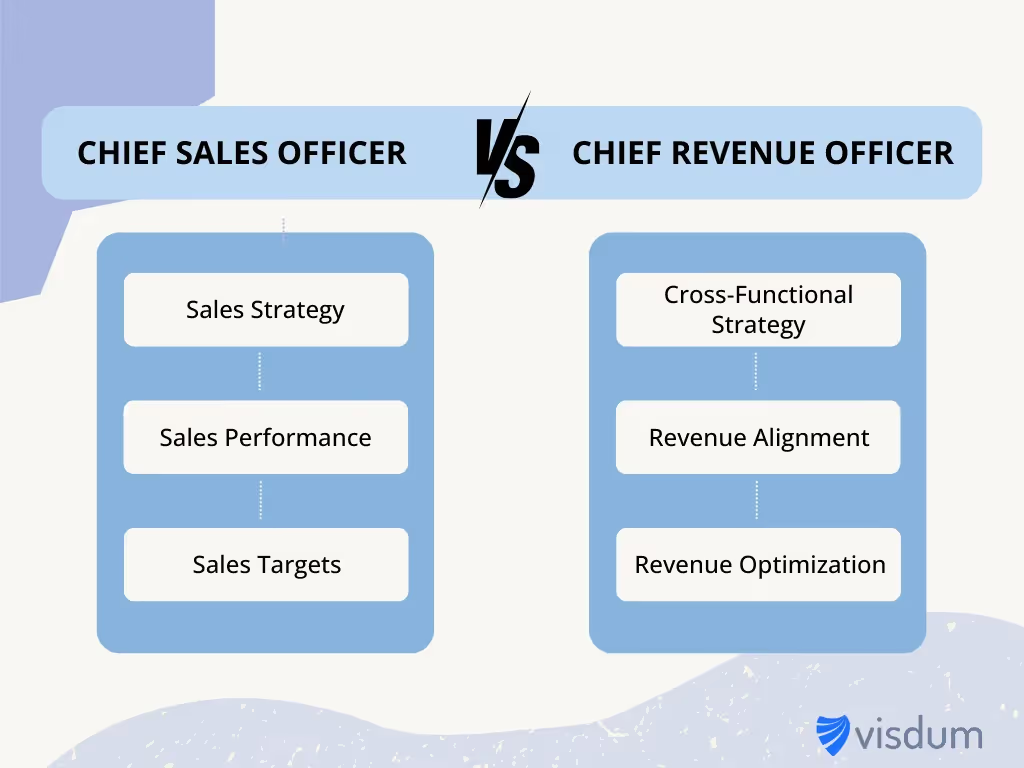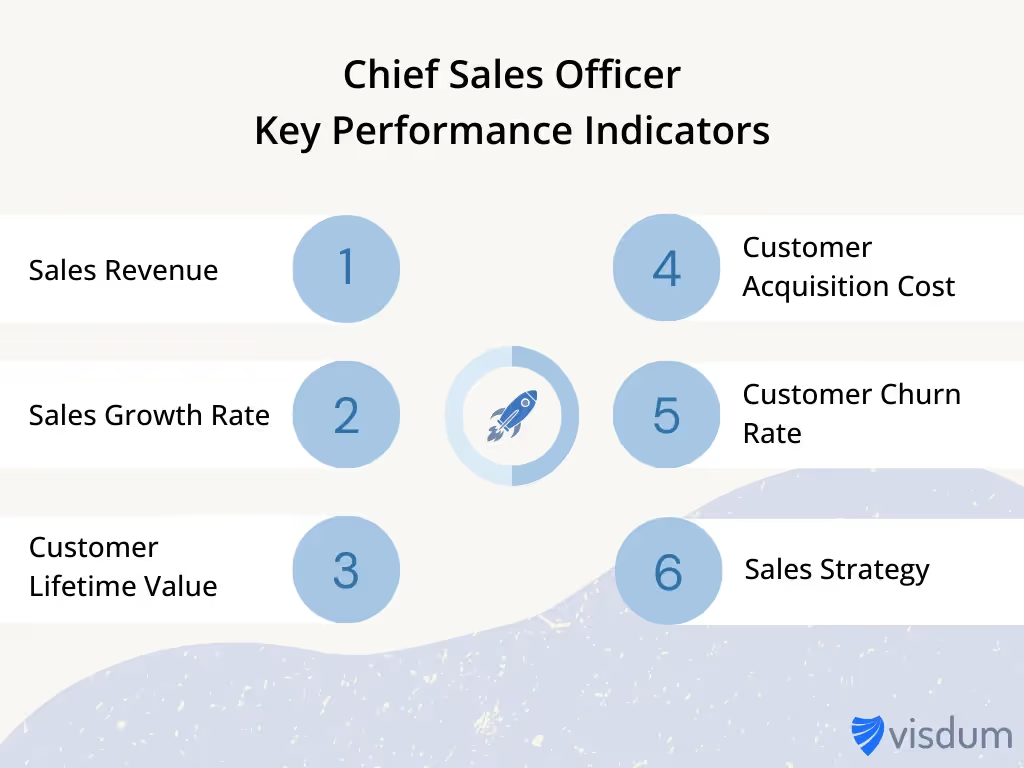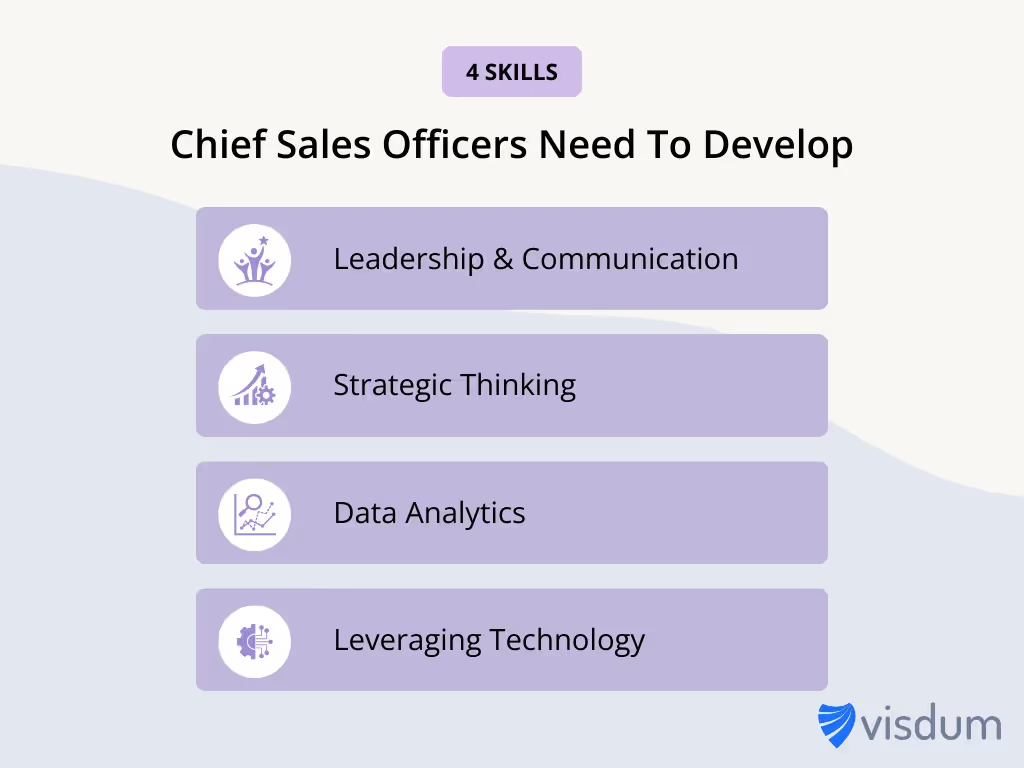Chief Sales Officer: A Comprehensive Guide to the CSO Role

No business has any meaning without revenue, and where does the revenue come from?
Sales.
No matter how much you innovate, iterate, and improve; if you cannot get your sales to go up, growing a business is next-to-impossible. That is where a Chief Sales Officer comes in.
A CSO is the head of the sales endeavors of any organization.
From creating sales strategies, building sales teams, measuring results, and optimizing sales performance to designing business goals and targets, a CSO is the multifaceted controller of all things sales.
In this guide, we’ll take a closer look at the responsibilities, business goals of a Chief Sales Officer, the challenges they face, and share insights on what it takes to be an ideal Chief Sales Officer.
What Is a CSO (Chief Sales Officer)?
A CSO, or Chief Sales Officer, is a senior executive responsible for leading a company’s overall sales strategy and revenue-generation efforts.
In business, the CSO oversees sales teams, sets growth targets, designs go-to-market plans, and ensures sales operations align with broader company goals.
In many organizations, the Chief Sales Officer works closely with leadership teams to connect sales execution with business strategy and market expansion.
Understanding the Role of a Chief Sales Officer
A Chief Sales Officer is at the top of the sales hierarchy in any company. They are responsible for achieving targets for sales revenue and sales growth.
Any underlying functions that need to be carried out for reaching these sales targets are also ultimately the responsibility of the CSO. As such, CSO roles factor in a bunch of tasks that drive the growth of the organization.
A CSO needs to stay ahead of the competition. Their insight of the industry should reflect in their sales strategy, and should help harmonize business goals with sales goals.
Key Responsibilities of a CSO
- Strategy Planning and Implementation: There is a gargantuan number of ways any company can approach sales.
What is the right answer then?
Figuring this out is the responsibility of the CSO. They plan the sales strategy to meet the business goals, design the sales funnel and quotas, and ensure that the revenue curve is positive. The industrial landscape is always changing, meaning not only do CSO’s have to find the needle in the haystack, they have to do it multiple times to adjust to changes.
- Market Analysis and Intelligence: The CSO role involves keeping a close eye on the market. This includes tracking competitors, understanding customer behavior, and spotting trends early. These insights help CSOs make smarter decisions and protect market share in a competitive environment.
- Leadership and Team Development: Sales teams rely on clear leadership. A Chief Sales Officer guides sales managers and leaders across regions, supports hiring decisions, and ensures teams stay aligned. Strong leadership helps keep large sales organizations motivated and productive.
- Driving Growth and Monitoring Performance: Unfortunately, no business is on autopilot. In the background of a changing business environment, CSOs have to maintain growth rates and hit sales targets. Hence, it falls onto them to decide what is working, and what has to be chipped out to improve the situation.
They monitor the essential KPIs, and ensure that the business keeps growing. Strategic alignment of sales behavior is their bread and butter.
- Building Relationships: To reach the pinnacle of sales success, you constantly need to be aware of what your customers are thinking. Especially in the SaaS sales landscape, maintaining active communication with stakeholders is crucial. Customer relationship management should be one of the key focus areas of a CSO.
It is the CSO that keeps in touch with the leaders of customer organizations and incorporates their thoughts into the sales strategy.
Chief Sales Officer vs. Chief Revenue Officer: Distinguishing the Roles

These two titles might seem similar, and there definitely is an overlap between their objectives. But there are some crucial differences that completely transform each role into a separate requirement for businesses.
Both CSOs and CROs are focused on faster revenue growth. This is why they are often thought to be the same kind of role.
However, the CSO focuses on increasing revenue via improving sales performance whereas a CRO focuses on aligning various department’s activities and objectives with the objective of revenue maximization.
Who is a Chief Sales Officer?
Think of the CSO as the leader of everything sales. Sales growth, performance, and competitiveness are all their responsibility. As such, their tasks include planning and implementation of sales strategies, maintaining relationships with key customers, analyzing and optimizing sales performance, etc.
A CSO’s focus is entirely on maximizing sales performance and meeting targets. They ensure that sales objectives align with business objectives.
Who is a Chief Revenue Officer?
A CRO is a more comprehensive and distributed role. They account for each dollar in revenue and align the various departments such as sales, marketing, operations, etc. towards attainment of more revenue.
A CRO’s focus is on ensuring that each department’s activity is leading towards the ultimate goal of revenue, and that the effectiveness of such activity can be measured in terms of revenue gained.
CSO vs CRO vs VP of Sales: Key Differences
Chief Sales Officer Salary and Compensation
Sales is the heart of a business, and a CSO is at the heart of sales. This warrants adequate compensation for their duties, and CSO is often one of the most highly paid roles in an organization, up there with the Chief Executive Officer and other company leadership.
A CSO’s salary depends upon the size of the organization, the region, and the scope of their duties. Moreover, A CSO’s compensation almost always includes sales bonuses, SPIFFs, and other incentives.
In the United States, the average Chief Sales Officer salary is around $180,000 with the total compensation being up to $3,60,000, according to PayScale. According to Glassdoor however, estimated total pay for a Chief Sales Officer is $525,540 per year.
When talking about the UK, the average salary for a CSO ranges from an average of £186,718 to a total compensation of around £2,50,000, according to Salary.com.
A CSO’s role in Sales Strategy: A Deeper Dive
Becoming a CSO is akin to being handed control of a large ship in stormy waters, then expected to sail through in record time. It's tough, complex, but beyond the norm exciting.
A CSO works closely with marketing, ensuring the right messages are being spread through the right channels.
A sales strategy requires the right product placement, intensive effort in the right sales channels, and constant improvements in the processes. The whole system is alive, and the CSO has to act as the brain.
By utilizing technology more efficiently, a CSO can get his hands on the finer details through more refined data. Technological automation tools for sales end up optimizing and streamlining the process, freeing up some time for the CSO to focus more on strategy.
KPIs and Metrics for CSO's

Chief Sales Officers have to continuously update the sales strategy according to the performance of the entire sales department and the objectives of the organization. These factors manifest in the form of certain KPIs (Key Performance Indicators).
Essential KPIs Every CSO Should Monitor
- Sales Revenue: Perhaps the biggest indicator of sales success is sales revenue. It's the total amount of revenue generated through sales in a specific period of time. Not only should this figure be maximized, but the factors playing into creating this figure must be carefully analyzed and optimized by the CSO.

- Sales Growth Rate: This KPI is the percentage increase in sales revenue over the last time period. It might be measured monthly (MoM Sales Growth Rate), quarterly (QoQ Sales Growth Rate), or yearly (YoY Sales Growth Rate). This indicates whether your business is growing or not and you can take steps accordingly to increase your growth rate.
- Customer Lifetime Value: Customer Lifetime Value is a metric that shows the average amount of revenue generated per customer over their lifetime. A high CLTV indicates that your customers are satisfied with your product and that your message is being delivered correctly.
- Customer Acquisition Cost: CAC is the cost incurred by a company in acquiring every new customer. In a sales department, there are a lot of expenses such as salaries of sales reps, commissions, etc. Marketing expenses for generation of leads can also be associated with sales. If the CAC is too high, your sales and marketing operations are not efficient.
- Customer Churn Rate: This is the percentage of customers that stop doing business with you after getting onboarded. Higher churn rates may indicate that your customers aren’t getting what they want.
- Conversion Rates: Conversion rate refers to the number of customers acquired from a given number of leads that were generated. Higher conversion rates demonstrate an effective and well-trained sales team, whereas lower rates indicate the opposite.
Experience and Skills Required to Become a Chief Sales Officer
CSO roles require a lot of expertise and analytical ability. To build a powerful sales arsenal, technological competence and the know-how to leverage technology to fuel sales objectives is also required.
As a CSO is at the pinnacle of all sales roles, they must have demonstrated sales experience and even better is demonstrated sales success.
Prior to being CSOs, most sales leaders have been sales managers, or regional heads of sales for many years. This experience serves as evidence that these individuals have what it takes to comprehensively cover every aspect of sales, and that too in a successful way.
💡DYK: Incoming CSOs have at least 10-15 years of high-level sales experience.
What skills are required for becoming a Chief Sales Officer?

- Strategic Thinking: This one doesn’t really need an explanation. Imagine how big-brain you have to be to compete with hundreds of players in a market and figure out how to outperform them, while they are trying to do the same. Strategic thinking is crucial in developing innovative sales strategies, overseeing their implementation, and adapting to changes.
- Leadership and Communication: As the top of the sales chain, the CSO is expected to lead the sales team competently, and be swift enough to catch the inefficiencies in sales teams. CSOs have to train and oversee the entire sales team, and nothing less than impeccable leadership and communication can cut it. Excellent customer service behavior has to be tailored. Designing the right processes to adequately motivate and incentivize the sales teams is essential to boost their performance and make sustained long-term sales performance a reality.
- Data Analytics: The sales strategy evolves according to the performance, objectives and consumer behavior. To react effectively, the sales leader must be savvy with handling large sets of sales data and deriving actionable insights from it. Projecting revenue, performance analysis, grabbing crucial insights from KPIs, and controlling them in the organization's favor is all on the CSO.
- Leveraging technology: A CSO must efficiently utilize CRMs, sales enablement tools, commission tracking software, and other software utilized by the organization. This is essentially where the entire business is operating. AI advancements in sales are also a promising avenue being explored.
Navigating Challenges as a Chief Sales Officer
Being a CSO is full of challenges. From sudden inexplicable drops in revenue to key customers churning on a fine Tuesday morning. There is no shortage of sales problems in the way of perfecting the sales operations for a business. However, it is expected of a CSO to be dynamic enough to navigate these hurdles.
Overcoming Common Sales Leadership Hurdles
Some of the most common leadership hurdles faced by CSOs are:
- Market Changes: Competition never really slows down. A CSO keeps a close eye on the market, studies what competitors are doing, and listens to changing customer needs. These insights are then used to refine sales processes, improve customer experience, and find new ways to drive revenue.
- Team Motivation and Underperformance: Every sales team goes through rough patches. When performance dips, a CSO’s job is to help the team learn from it rather than panic. Through regular training, feedback, and course correction, sales reps are guided toward better habits and stronger results over time.
Hiring and Retention: Good sales talent is hard to come by. CSOs work with HR to hire people who are driven, persuasive, and strong communicators. In digital-first companies, they may also help recruit eCommerce leaders. Once the right team is in place, the focus shifts to training, motivating, and compensating them well so they stay engaged and perform at their best.. A sales compensation software can really help with the last of those factors.

Wrapping Up
In conclusion, we can definitely agree on just how important a CSO is for having the most optimal sales performance. CSOs streamline sales and transform it from a business function to a revenue-generating machine.
From training the sales department to adjusting their behavior according to business goals, a CSO is all about growth. Emerging technologies and automation tools that simplify sales are a good support system for magnifying a CSOs focus on the more pressing tasks.
FAQs
What is a CSO?
A CSO, or Chief Sales Officer, is a senior executive responsible for leading a company’s sales strategy and driving revenue growth through sales execution. The CSO oversees sales teams, sets targets, and aligns sales operations with overall business objectives.
What does a Chief Sales Officer do?
A Chief Sales Officer designs and executes the company’s sales strategy, manages sales leadership teams, and ensures consistent revenue performance. Their responsibilities typically include forecasting sales, optimizing sales processes, expanding markets, and improving team productivity.
Is CSO higher than VP of Sales?
Yes, a CSO is typically senior to a VP of Sales. While the VP of Sales focuses on managing sales teams and execution, the CSO owns the broader sales vision, strategy, and alignment with company-wide goals.
What is the difference between a CSO and CRO?
The main difference is scope. A CSO focuses on sales-driven revenue, while a CRO (Chief Revenue Officer) oversees all revenue-generating functions, including sales, marketing, and customer success. The CRO has end-to-end revenue ownership, whereas the CSO specializes in sales performance.
What does CSO mean in business?
In business, CSO stands for Chief Sales Officer, a C-level role responsible for scaling sales operations, increasing revenue, and aligning sales strategy with the company’s growth plans.
What Qualifications Are Needed to Become a CSO?
A CSO needs an elite mix of education, experience, and training to succeed at their role. Demonstrated success is a key factor. Generally, a bachelor’s and master’s degree in business management or administration is required. Excellent leadership and communications skills are also necessary.
How Does a CSO Contribute to Strategic Planning?
A CSO develops sales strategies and ensures they are aligned with the overall business goals. These may include targeting a specific segment, region, etc. They also develop sales forecasts to help the company know how much revenue will be generated over a period of time. The CSO also plays a crucial role in strategic planning by analyzing and making recommendations for improving sales effectiveness. They examine every aspect that affects sales including business tactics, pricing and competitor activities, to help the company stay ahead.
What Are the Biggest Challenges for a New CSO?
The biggest challenges for a new CSO are often taking over existing relationships, understanding the positioning of the company and boiling them down to sales objectives. Getting used to managing the entire sales division of a company can be a daunting task, but with the right skillset and confidence, including strong communication skills, it can be done excellently.
How Can a CSO Effectively Measure Team Performance?
Various KPIs such as conversion rate, attainment ratios of sales targets, number of leads generated, etc. can allow a CSO to measure their team’s performance. It is important to be dynamic and keep training the sales personnel and updating the goals to ensure team performance goes up.
What is the difference between a CCO and a CSO?
A CCO (Chief Commercial Officer) is responsible for developing a more comprehensive commercial outlook for the business. They make important decisions regarding market expansion, business model, marketing approach, etc. In comparison, A CSO (Chief Sales Officer) is focused on improving sales and its operations.
What is the difference between a CSO and a CRO?
A CSO is focused on enabling sales and boosting sales revenue, whereas a CRO comprehensively oversees the entire customer lifecycle and accounts for efficiency in generating revenue across all departments.


.webp)


